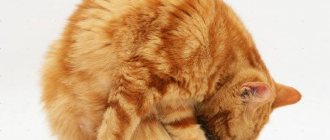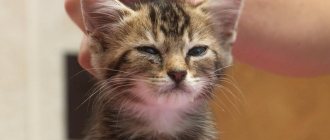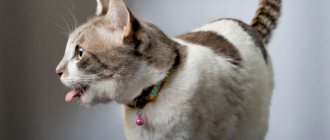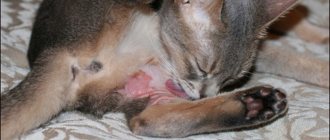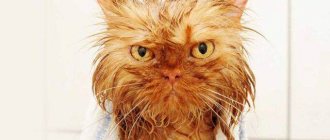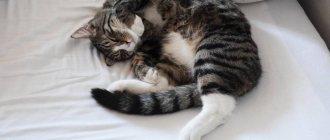A cat is one of the cleanest animals; it can lick its fur for hours, putting it in order. She does not change her habit either after eating and sleeping, or after visiting the toilet and petting her owners. But sometimes pet owners begin to notice that the cat is more habitually engaged in grooming than usual, and the habit of licking turns into manic obsession. Now all the time, outside of sleeping and eating, the cat constantly licks its fur. This behavior of the animal not only can, but should alert the owner.
Why does a cat constantly lick its tail?
The owners of tailed purrs notice this pathological habit immediately, because it can be terribly annoying, especially if the pet does it near people and even on their bed. You shouldn’t just drive the animal away, as there are many reasons for this behavior. Moreover, they all require contacting a veterinarian. A cat can lick its tail for hours due to:
- allergic reaction to certain foods;
- the presence of parasites in the body (with this disease, the cat will not lick the fur, but directly the anal entrance);
- skin damage on the tail.
A symptom such as licking under the tail often indicates that the pet is under stress. Stress can be caused by the fact that the house has another pet or is undergoing renovations. Constant licking has a calming effect on your furry pet.
Prevention measures
- Limit your indoor cat's contact with street animals. At the same time, do not deprive her of fresh air: you can let your pet out onto the balcony or into a fenced-in space, for example, in the country.
- Timely treat your pet against external (fleas, ticks) and internal (helminths) parasites.
- Inspect the animal's fur and skin.
- Provide a balanced diet and avoid consuming foods that cause allergic reactions.
- Cats feel the manifestation of love and care from humans. You should not allow your pet to experience stress. Any worries and neuroses are the first step towards the development of diseases.
- Regular visits to the veterinary clinic.
Why does a cat lick its fur in different places, but the animal has no fleas?
The presence of fleas in a pet is the first thing a cat owner thinks about if he notices that he is constantly licking his fur. Even if a quick examination did not reveal parasites in the fur, this does not mean that they are not there. Nits are not so clearly visible; they look like black, very small dots on the skin between the hairs.
However, the cause of constant licking of fur can be not only fleas, but also other skin parasites - scabies mites. It is quite easy to identify them by such signs as the presence of lesions on the skin in the area of the ankles, ears and elbows.
If a cat licks its fur mainly in the summer, but does not have fleas or parasites, there is a possibility that the pet has increased sensitivity to insect bites, such as mosquitoes.
Constant licking of a cat's fur in the absence of parasites may be an initial sign of one of the pathological conditions:
- depriving;
- dermatitis;
- endocrine system disorders;
- otitis;
- skin diseases - demodicosis, pyodermatitis.
All these pathologies, in addition to constant licking, are accompanied by other symptoms - the presence of wounds and erosions on the surface of the skin, areas of severe peeling.
Signs of lichen and fungal infections
Infection of the skin with lichen forces cats to clean their toilets more carefully than usual. If the owner notices that his pet has begun to lick its fur most of the time, you need to carefully examine its skin. If there is lichen on the skin, pockets of erosion or scabs will be visible between the hairs.
With fungus everything is much more complicated.
It is impossible to determine the presence of a fungal infection without examination by a veterinarian and instrumental examination using special equipment.
But there are a number of signs that an attentive owner will notice:
- excessive dry skin;
- the skin in certain areas changes its color, becomes paler or, conversely, stands out excessively, becoming darker or brighter by several tones;
- the appearance of gray scales that separate from the skin;
- the fur becomes thinner.
Similar signs may be present in other skin diseases, so it is not possible to make a diagnosis without a veterinarian.
Dermatitis
Identifying dermatitis in a cat is no less difficult a task than diagnosing a fungal infection. A cat will constantly lick its fur because it suffers from an incessant feeling of itching and burning. One of the most pronounced signs of dermatitis is the presence of inflammatory processes on the skin.
It is almost impossible to determine the presence of dermatitis at an early stage of its development, therefore, if the owner notices that his cat has clearly begun to lick itself longer and more often, it should be immediately shown to a veterinarian.
Otitis
An ear infection is always accompanied by severe itching. The cat will lick itself vigorously, damage its face and ears with its claws, and constantly shake its head. Other signs include redness of the inside of the ear, swelling and pus discharge.
Development of skin diseases
Demodecosis and pyodermitis are pathologies of the skin that are accompanied by severe and constant itching, while the cat experiences severe, ongoing discomfort. Due to the incessant “mange”, the cat begins to lick its fur and sometimes does it so intensely that bald patches appear on the fur.
Prevention
Preventive measures boil down to following the following recommendations:
do not allow your pet to come into contact with stray animals;
use special means for the prevention of parasitic diseases (collars, sprays, drops, etc.);
Regularly comb the animal and monitor the condition of the skin and coat;
feed with good quality food and mixtures from trusted manufacturers;
Visit your veterinarian regularly for a clinical examination.
The owner should know that the pet’s close attention to its coat, constant licking, and combing the skin with its paws is not a harmless phenomenon. As a rule, such anxiety is caused by the development of the disease
Only a veterinarian can identify the cause, make a diagnosis and prescribe treatment for a pet.
- How to determine lichen in a cat, what it is and how... This form of the disease causes anxiety in the animal, burning and itching. ... To do this, you need to regularly monitor the condition of the skin. ... Why is a cat thin, reasons why a cat doesn’t... Read more
- Why does a cat's hair fall out, it comes out in clumps...
Key reasons why a cat's hair falls out. Fluffy and affectionate cats are a real decoration for any home. ... With allergic hair loss, the owner will also experience itching, redness of the skin... Read more - The cat scratched its ear until it bled: what to do if it itches...
Reasons for the animal's behavior. The reasons why a cat scratches its ears... A parasitic mite gnaws through the layers of the epidermis and violates the integrity of the skin. ... The animal has severe itching and restless behavior. Read more - Ringworm in a domestic cat: where could it come from?
The main reasons why lichen in a domestic cat can arise. ... injuries and microtraumas of the skin ... The disease is accompanied by itching. An infected animal often itches and behaves restlessly. Read more - How to treat lichen in a cat, what to smear and treat...
Lichen planus. It causes a malfunction of the immune system and is a non-contagious form. ... The cat is bothered by itching and scratches often. ... Violation of the integrity of the skin leads to the penetration of bacteria and... Read more
Licking to the point of baldness
The owner of a purring dog may not even realize that constant, almost non-stop licking of fur is a symptom that the pet is in a state of psycho-emotional instability.
As a rule, all owners are accustomed to the fact that cats lick themselves because they have dermatitis or parasites, but it is also possible that the cat is experiencing real emotional torment. This picture can be observed when an animal needs to mate.
In order to normalize the pet’s condition, after which, accordingly, the bad habit of constantly licking the fur will go away, it is enough to give the cat to drink medications that have a sedative spectrum of action. But it should be borne in mind that they must be taken carefully so that they do not cause side symptoms or addiction in the pet.
Non-Dangerous Reasons for Unusual Behavior
Non-dangerous reasons are explained by various instincts and characteristics of cat behavior. They are not dangerous and do not require adjustment. Making changes in such situations is a purely voluntary matter, so start from your own feelings.
Influence of instinct
From early childhood, kittens get used to asking for food by licking the mother cat's face. After entering a human family, it is replaced by the hands of its owner.
The act of licking is often repeated after lunch. In this case, the animal simply thanks you for the delicious food and expresses its gratitude.
A way to communicate and attract attention
In addition to hearing and voice, animals use smell and tactile sensations to communicate. With their sensitive tongue, they read information about new acquaintances and learn about the mood of their owners.
Obsessive hand licking may also indicate attention deficit. If your pet is often left alone, then in this way he is trying to attract you to play games together - or to watch a series in a hug.
Cleanliness, influence of odors
Cats are the cleanest animals. They are extremely sensitive to odors and always lick the hands of their owners, trying to eliminate the unpleasant aroma.
The opposite situation is also possible. If the smell is pleasant, the pet will lick the person for pleasure. Most often, cats are attracted to the taste of sweat and certain creams.
Compassion or treatment of a person
Empathic cats acutely perceive any experiences of their owners. By licking a person, they try to calm and encourage him. They do the same when they detect wounds or diseased areas.
Demonstration of superiority or leadership
Unlike dogs, cats either accept the role of equal partners or put themselves at the head of the house. In the latter case, licking is explained by condescension towards the nurse and emphasizing one’s own status.
If an unpleasant habit appeared after the castration procedure
The fact that an animal licks itself non-stop after sterilization is a normal, understandable phenomenon. After surgery, when the incision scar begins to heal, this process is accompanied by severe itching and burning. It is not surprising that the cat will try to relieve discomfort by constantly licking the skin.
But it is important for the owner to understand what this can lead to. If the suture is constantly wet after surgery, this will lead to poor and too slow healing and increase the risk of secondary infection.
To protect against negative consequences, the pet is recommended to wear a surgical collar for 10 days after castration, until the suture finally heals.
Is this normal if fleas have nothing to do with it?
Because cats spend so much time keeping themselves clean, owners don't notice the problem coming. Cleanliness is not the only reason for washing cats. With its tongue, the cat evenly distributes the sebaceous secretion secreted by the skin.
When exposed to sunlight, it turns into vitamin D, making the coat soft and protecting the skin. Neatly laid fur provides the cat with the usual thermoregulation.
The cat is licking itself. Burning and itching of the skin becomes an alarm bell, the cat itches until it hurts and hair falls out along its back or belly. Excessive hair loss due to prolonged brushing is not normal. By scratching the skin with its rough tongue or sharp claws, a cat can cause an infection. Concomitant infection will increase licking, leading to a vicious cycle.
Important! If a cat endlessly scratches or licks the same area, it will cause acute moist dermatitis (hot spots), although dogs are more susceptible to this condition.
The usual culprit for scratching in cats is parasite bites, but why does a cat itch if it doesn't have fleas and ticks?
[custom_ads_shortcode1]
Diagnostic measures
Constant licking of fur is an alarming symptom, indicating that pathological processes are occurring in the animal’s body, often associated with mental instability and severe stress. Therefore, it is recommended to immediately take the cat to the veterinarian to identify the causes of this phenomenon and make an accurate diagnosis.
The veterinarian will conduct a visual examination of the animal and prescribe a number of laboratory tests. If dermatitis, fungal infection or infectious skin diseases are suspected, a bacteriological culture from the affected area is taken. If the doctor suspects that the cat has problems with the functioning of the endocrine system, it will be necessary to take a blood test for hormones.
Skin diseases
As a rule, they are all infectious in nature and occur after a pet comes into contact with an infected object. Sometimes it is enough for a cat to go outside just once to pick up some kind of infection. Often, diseases such as pyodermatitis, cheyletiellosis, demodicosis, and scabies occur.
They are also caused by mites that parasitize the upper and deep layers of the skin. Severe itching in the first stages very quickly develops into general skin damage and baldness.
If a cat's skin problems are detected, the cat owner needs to thoroughly wash their hands with soap and maintain personal hygiene, since many viruses and bacteria can be transmitted to human hands.
[custom_ads_shortcode1]
Therapeutic measures
Constant licking of fur is not a separate disease, but a symptom of a certain pathology, so treatment is selected individually, depending on the diagnosis:
- If the cause of the symptom is diseases such as allergic reactions to food or hygiene products, local spectrum drugs are prescribed - ointments and creams that eliminate unpleasant symptoms, itching and burning. To prevent allergies from occurring again, you need to determine what exactly was the allergen, otherwise the discomfort will return again. In case of a severe allergic reaction, antihistamines are prescribed for internal use.
- Infections and inflammations on the skin of infectious origin require a course of antibiotics.
- If a fungus has been identified, antifungal medications are prescribed.
Also watch the video why cats lick themselves so often:
Allergy
If you regularly treat your cat's fur for parasites and the veterinarian's analysis does not show their presence, the cause of the itching may be an allergy. Pedigree cats and cats suffer from it especially often. This may be, like in humans, a manifestation of sensitivity to food, furniture upholstery, or some chemical component. A particularly clear sign of an allergy is when a cat licks itself heavily, thus trying to scratch its nose and lips.
Allergies can be not only to food components, but also seasonal or, for example, to dust and pollen. It is important to get tested and identify the irritating allergen as soon as possible.
[custom_ads_shortcode2]
What to do if a cat licks itself until it has bald patches and wounds?
The most reasonable solution in this situation is to show your four-legged pet to a veterinarian. An attempt to help a pet on your own is fraught with serious consequences for its health, since it is impossible to determine at home what exactly led to such unusual behavior of the animal.
The veterinarian will prescribe an examination for the four-legged patient and identify the cause of persistent licking, accompanied by exposure of the skin and the appearance of wounds on it. If parasites are the culprit of the cat’s behavior, she will be prescribed antiparasitic veterinary medications. If it turns out that the source of the problem is a malfunction of any internal organ, the cat will be prescribed appropriate treatment.
It is not always necessary to treat a pet that licks its skin to bald spots. Sometimes it’s enough to simply calm him down by creating a calm atmosphere in the house, or give him a bath if he thinks his fur smells of something unpleasant. In the latter case, you need to use zoo shampoos - they do not contain fragrances.
Treatment
If you notice that your cat is constantly itching, licking itself, and at the same time acting restlessly, hitting its tail, you should immediately take your pet to the veterinarian. It is better not to try to establish the cause and diagnosis yourself, since many of the symptoms are similar to each other. Laboratory analysis and proper examination will be required.
If the reason that the cat is constantly itching, licking and licking itself lies in fleas and other skin and fur parasites, then external treatment is prescribed. The veterinarian may prescribe special drops or sprays, or recommend treating the animal with medicated shampoo. As a rule, using all these drugs several times helps to quickly remove itching and irritation and overcome parasites. In the future, only timely prevention will be required.
If the skin ailment is caused by an infection or fungus, medicinal sprays and drops will also help in the early stages. But, as practice shows, special medications and antibiotics may still be required. If the cat is constantly itching, licking its face, scratching its ears and eyes, antihistamines are prescribed. An accurate analysis is performed and the source of the allergy is determined.
[custom_ads_shortcode3]
The desire to cleanse itself as a reaction to foreign odors on the fur
Cats are very clean creatures. In addition, they have an excellent sense of smell, thanks to which they are able to sense even subtle odors. If the pet feels that its fur smells of something, it will begin to lick it until it completely gets rid of it. Sometimes this desire leads to bald spots appearing on the body of an animal that washes itself too zealously.
